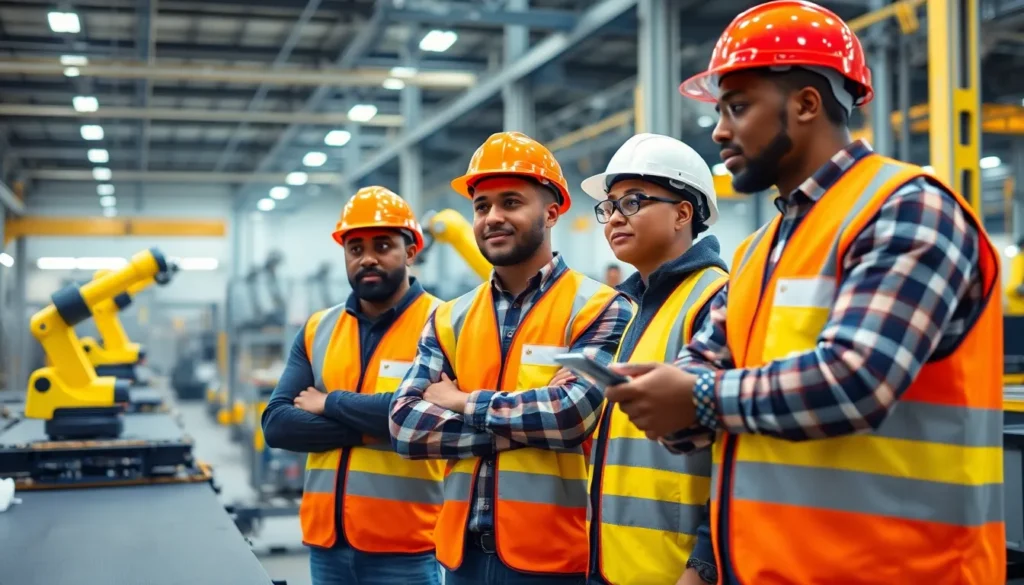Table of Contents
ToggleArtificial intelligence is revolutionizing industries across the globe, transforming how businesses operate and innovate. From manufacturing to logistics, AI applications are streamlining processes, enhancing productivity, and driving significant cost savings. As companies increasingly adopt these technologies, the landscape of industrial operations is evolving at an unprecedented pace.
In this new era, AI isn’t just a buzzword; it’s a powerful tool that empowers organizations to make data-driven decisions and optimize their workflows. The integration of AI in industrial applications is not only reshaping traditional practices but also paving the way for smarter, more efficient systems. As the potential of AI continues to unfold, understanding its impact on various sectors becomes essential for staying competitive in today’s fast-paced market.
Overview of AI Industrial Applications
AI plays a critical role across multiple industries, driving innovation and efficiency. Companies leverage AI for various applications, enhancing both operational effectiveness and decision-making capabilities.
Manufacturing
- Predictive Maintenance: AI analyzes data from machinery to predict failures, reducing downtime and maintenance costs.
- Quality Control: AI systems detect defects in real-time, ensuring products meet quality standards.
- Supply Chain Optimization: AI forecasts demand and manages inventory, improving overall supply chain efficiency.
Healthcare
- Diagnostics: AI algorithms analyze medical images and patient data to assist in early diagnosis of diseases.
- Personalized Medicine: AI helps tailor treatments based on patients’ genetic profiles and health histories.
- Operational Efficiency: AI streamlines administrative tasks, allowing healthcare professionals to focus on patient care.
Finance
- Fraud Detection: AI scrutinizes transaction patterns to identify and flag suspicious activities, mitigating financial losses.
- Algorithmic Trading: AI executes trades based on market data, maximizing potential returns for investors.
- Risk Assessment: AI evaluates credit risks by analyzing consumer data and behavior.
Transportation and Logistics
- Autonomous Vehicles: AI enables self-driving technology, enhancing safety and efficiency in transportation.
- Route Optimization: AI-driven systems calculate the most efficient routes, reducing fuel consumption and travel time.
- Fleet Management: AI monitors vehicle performance, optimizing maintenance schedules and resource allocation.
Retail
- Customer Insights: AI analyzes consumer behavior to predict trends, informing product development and marketing strategies.
- Inventory Management: AI automates stock replenishment, minimizing excess inventory and stockouts.
- Personalized Shopping Experience: AI tailors product recommendations to individual preferences, boosting customer satisfaction.
Energy
- Smart Grids: AI optimizes energy consumption and distribution, improving overall grid efficiency.
- Renewable Energy Management: AI predicts energy generation from renewable sources, facilitating better integration into the energy mix.
- Predictive Analytics: AI analyzes usage patterns to improve maintenance and reduce operational costs in energy infrastructures.
Agriculture
- Precision Farming: AI employs data analytics for optimizing crop yields through targeted interventions.
- Crop Monitoring: AI drones gather data on crop health, assisting in timely decision-making to maximize productivity.
- Resource Management: AI optimizes water and fertilizer usage, enhancing sustainability in farming practices.
AI’s implementation across these sectors evolves continually, equipping organizations with the tools necessary for advancement in an increasingly competitive market.
Key Industries Utilizing AI

AI plays a pivotal role in transforming key industries, driving efficiency and innovation. Several sectors are harnessing AI technologies to enhance operations and improve outcomes.
Manufacturing
AI enhances manufacturing through automation, predictive maintenance, and quality assurance. Companies utilize AI algorithms to analyze machine performance data, predicting when maintenance is necessary, thus reducing downtime by 20-30%. AI-driven robots perform repetitive tasks with precision, increasing productivity by up to 40%. Moreover, AI systems perform real-time quality checks, ensuring products meet specifications and lowering defect rates significantly.
Healthcare
AI revolutionizes healthcare services by improving diagnostics and treatment plans. Algorithms analyze patient data, enabling healthcare providers to identify diseases early, often increasing treatment success rates by as much as 30%. AI chatbots assist in patient interactions, reducing administrative burdens and enhancing patient satisfaction. Furthermore, AI supports personalized medicine, tailoring treatments based on individual genetic profiles, which boosts efficacy in therapies.
Transportation
AI transforms transportation through autonomous vehicles, route optimization, and traffic management systems. Companies implement AI for real-time route adjustments, cutting fuel costs by approximately 10-15% and improving delivery times. Autonomous vehicle technology enhances safety, with AI systems detecting and responding to potential hazards faster than human drivers. Additionally, AI-driven traffic management optimizes flow in urban areas, reducing congestion and commute times by up to 25%.
Benefits of AI in Industrial Settings
AI significantly enhances industrial operations, leading to remarkable improvements in efficiency, productivity, and cost management.
Efficiency and Productivity
AI optimizes processes through automation, enabling machines to perform repetitive tasks with high precision. In manufacturing, AI manages production schedules, reduces cycle times, and improves overall equipment effectiveness (OEE). Predictive maintenance, leveraging AI algorithms, anticipates equipment failures, cutting downtime by 20-30%. This proactive approach allows organizations to allocate resources effectively, leading to a productivity increase of up to 40%. Additionally, AI-powered analytics streamline supply chain management, ensuring timely deliveries and reducing lead times.
Cost Reduction
AI implementation translates to significant cost savings across industries. By optimizing workflows and minimizing waste, organizations experience a decrease in operational costs. For example, AI in logistics achieves an average reduction in fuel costs by 10-15% through route optimization. In manufacturing, automated quality control systems detect defects early, preventing costly recalls and rework. Moreover, AI improves resource allocation, allowing companies to lower expenses related to labor and materials, ultimately promoting overall financial health.
Challenges in Implementing AI
Implementing AI in industrial applications presents several challenges that organizations must navigate. Key issues include data privacy concerns and integration with existing systems.
Data Privacy Concerns
Data privacy remains a significant challenge for AI implementation. Organizations collect vast amounts of sensitive data to train AI models, leading to potential breaches and compliance issues. Current regulations, such as the General Data Protection Regulation (GDPR), mandate strict data handling practices. Non-compliance can result in substantial fines and reputational damage. Companies must establish robust data governance frameworks to safeguard personal information while harnessing AI’s capabilities.
Integration with Existing Systems
Integration with existing systems poses another challenge in AI deployment. Organizations often rely on legacy systems that may not support advanced AI technologies. Compatibility issues can arise, leading to increased costs and extended timeframes for implementation. Successful integration requires a clear understanding of current infrastructure and potential upgrades. Organizations must invest in scalable solutions and skilled personnel to ensure smooth integration, facilitating effective AI applications while minimizing disruptions to ongoing operations.
Future Trends in AI Industrial Applications
AI industrial applications will continue evolving, significantly impacting various sectors. The following trends are anticipated to shape the future landscape of AI implementation:
- Increased Automation
Increased automation will drive efficiency as industries adopt AI-powered robots for routine tasks and complex operations. Manufacturing sectors will likely see robots handling assembly lines, leading to a 25-30% reduction in labor costs.
- AI-Powered Analytics
AI-powered analytics will refine decision-making processes. Organizations will leverage real-time data analysis for improved operational insights, enabling five to ten times quicker response times in strategic planning and market adjustments.
- Enhanced Predictive Capabilities
Enhanced predictive capabilities will support proactive measures in industries. Predictive analytics in retail could lead to a 15% increase in sales through targeted promotions and inventory management.
- Personalization Across Sectors
Personalization will gain prominence in customer engagement. Major retailers utilizing AI for tailored recommendations expect an increase in customer retention rates by 20% as tailored experiences resonate with individual preferences.
- Integration of IoT and AI
The integration of IoT and AI will transform operational responsiveness. Smart factories utilizing interconnected devices will experience optimal production strategies, reducing production delays by up to 40%.
- Sustainability Initiatives
Sustainability initiatives will drive AI’s role in resource management. Energy sectors employing AI for predictive analysis in renewable energy resource allocation could yield a 30% decrease in wastage.
- Regulatory Compliance Through AI
Regulatory compliance will evolve through AI applications. Automated compliance systems will ensure organizations meet industry standards, decreasing non-compliance costs by around 15%.
- Focus on Edge AI
Focus on edge AI will bolster speed and efficiency. With data processing occurring closer to the source, latency issues diminish, enhancing performance in critical applications like autonomous vehicles.
- AI-Driven Workforce Transformation
AI-driven workforce transformation will necessitate reskilling. As automation rises, organizations will prioritize employee training programs, leading to a more adaptable workforce ready for advanced technological roles.
- Collaborative Robotics (Cobots)
Collaborative robotics will increase in workplaces, allowing humans and robots to operate alongside each other. Cobots in warehouses will lead to a 20% boost in operational efficiency due to streamlined workflows.
These trends reflect an ongoing shift in how industries integrate AI technologies, fostering innovation and improving operational excellence. As AI’s capabilities expand, organizations must stay informed to leverage these advancements effectively.
AI’s influence across industries is undeniable and continues to reshape how organizations operate. By leveraging AI technologies, businesses can enhance efficiency and drive innovation while addressing the challenges of data privacy and system integration.
As the landscape evolves, staying abreast of emerging trends will be crucial for companies aiming to maintain a competitive edge. Embracing automation and predictive analytics will not only streamline processes but also foster a culture of continuous improvement.
With AI at the forefront of industrial advancement, organizations that adapt and innovate will thrive in this dynamic environment. The future of AI in industry is bright and full of potential for those ready to embrace it.




